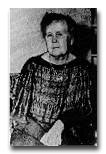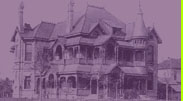GREAT CITIZENS - ANNETTE FINNIGAN
 Many of the gifts of Annette Finnigan, suffragette, art patron and philanthropist, benefited Houston's public library system while Ideson was still its head.
Many of the gifts of Annette Finnigan, suffragette, art patron and philanthropist, benefited Houston's public library system while Ideson was still its head.
Born in 1873 in West Columbia, Texas, Finnigan, in 1876, moved with her family to Houston, where her father, Captain John C. Finnigan, established a successful hide business.
Finnigan attended Houston public schools and Wellesley College in Massachusetts. As a young woman, she spent much of her time in New York City, where her father's business took the family. In 1905, the family returned to Houston.
After her father's death in 1909, Finnigan assumed active management of his business interests. She also became active in the leading social cause of the time--equal voting rights for women--working with the suffrage movement in Houston and throughout Texas. She and her sisters, Elizabeth and Katherine, contributed to the early organization of the Houston Suffrage League, and helped organize a 1913 suffragette march in Houston led by Angelina Pankhurst. In 1914, the state suffrage League elected Finnigan president. During the winter of 1915, she devoted her time to lobbying in Austin for the passage of an equal suffrage bill by the Texas legislature. It was effected three years later. She also served as president of the Woman's Political Union.
After a serious illness in 1916, Finnigan adopted a less strenuous lifestyle. She became interested in world travel and in collecting works of art, rare books and antiques. In 1931, she began donating gifts to the Houston Museum of Fine Arts and the Houston Public Library. Among the first of these was a textile collection from India, Iran and the Middle East. Other gifts to the museum included ancient Greek vases and funerary items, examples of medieval Spanish sculpture and decorative arts and a collection of rare laces. She also donated to the library 65 rare books, and items, dating from the twelfth through the seventeenth centuries: two twelfth century manuscripts, Ambrose and the Veberable Bede's Commentary on Tobias from part of the collection which also includes Oriental scrolls and reproductions of the Codex Aureus and Codex Alexandrinus, as well as some sixteenth century works on Petrarch, Erasmus, Ceasar and Dante. One of her last gifts to the City of Houston was an 18 acre site in the Fifth Ward, the North End of Houston at the time, for a "Negro park," a symbol of her concern for blacks at a time when public facilities were segregated.
Although she was a resident of New York City for the last 25 years of her life, Finnigan considered Houston her home. After her death in 1940 at the age of 67 her ashes were buried in the family plot in Houston.






